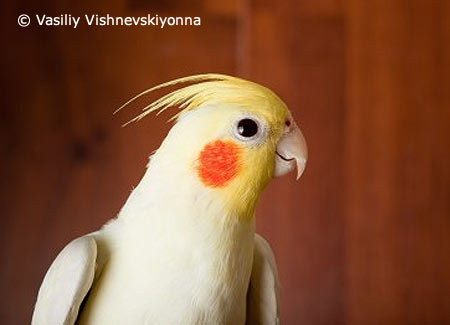Reasons Why Cockatiels Bite

Below are common reasons why a pet cockatiel may bite. Simply click on the biting topic below for more information. If you cannot determine why your cockatiel is biting with the information provided , please post your question on our parrot forum under the cockatiel section or head on over to our main cockatiel area.
- Reasons Why Cockatiels Bite
- Fearful Biting from a Cockatiel
- A Cockatiel Biting Out of Jealousy
- Cockatiel Territorial Biting
- Juvenile Biting in Cockatiels
- Reinforcement of Biting Unintentionally in Cockatiels
Cockatiel Territorial Biting
Territorial biting is very common in pet cockatiels and can be found in the tamest birds. The most typical example of a cocktail acting out aggressively is when an owner places their hand inside the cockatiel’s cage wishing for the parrot to step up unto their hand but instead the cocktail bites the owner due to protecting its territory. This territorial behavior can also be seen while birds are perched on stands. It is because cockatiels regard their stands as their own personal area and tend to protect that space. Once the bird bites, many owners will scold their pet cockatiel and then walk away.
It is important that owners realize biting is a natural behavior for
cockatiels, and these birds are hardwired to do this in order to protect
their territories. In regards to a cockatiel, a territory means
guaranteed food, a roosting site, and a nesting site. Though the
cockatiel might enjoy the owner’s company, it simply cannot control the
need to protect its space and territory. This behavior is especially
observed in female cockatiels; however, keep in mind that every bird is
different and there are some birds that are not territorial at all.
Solution: Stopping this behavior takes time and there are many things
that can be done to help eliminate it. The first thing would be to
continually rotate all objects throughout the cage on a daily basis;
toys, perches, and if possible food bowls. If items become too
stationary the cockatiels tend to develop territorial behaviors towards
the items within their environment.
Treats should also be used to help modify the bird’s behavior. This is a
positive reinforcement tactic that helps the bird to focus on the treat
rather than protecting its territory. The owner should hold the treat up
so the cockatiel can see it before being asked to step up unto a hand or
perch. Most cockatiels will comply as they want the treat. If the bird
is not willing to step up, the owner may use a toy or some other method
to distract the bird.
For extremely aggressive behavior, the owner could use a perch and ask
the bird to step up onto it. This should be done daily and a treat
should be given immediately after the cockatiel has completed the task.
Once the cockatiel confidently steps up onto the perch without
hesitation, the owner can start using their hand.
It is important the owner not pay attention to any biting. If the
cockatiel should bite, and difficult as it may be, the owner should
simply move their hand back and ignore it as if nothing happened. The
overall goal should be to let the cockatiel know that biting is not an
effective way to communication. Once the cockatiel understands this
rule, biting should be minimized.




